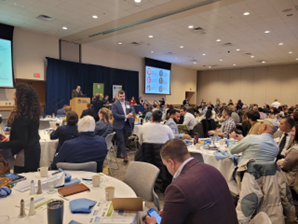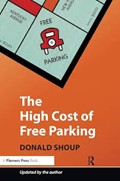The Latest News from PA Chapter of APA…
 Blowing Up Your Boards and Other Bold Ideas to Bring Your Comp Plan to Life
Blowing Up Your Boards and Other Bold Ideas to Bring Your Comp Plan to Life
April 2 from 12:00 pm – 1:15 pm
How do you guarantee that your community’s new comprehensive plan will see fruition? Operationalize its implementation. The presenters will explore fresh ideas for delivering on vision, highlighting an innovative accomplishment by the Municipality of Mt. Lebanon to completely restructure the community’s appointed advisory boards to align with the key issues at the center of Ascend Lebo, the recently adopted comprehensive plan. Discussion will also focus on inclusive engagement strategies to discern shared values and build momentum for progress, as well as integrating the plan into the Capital Improvement Program. You must attend the webinar live to earn CM credit.
Deadline to register is April 1.
National Planning Conference
The National Planning Conference (NPC25) is fast approaching. Register to attend NPC25 in Denver from March 29-April 1. Registration also includes registration for the online conference from April 23-25th. Register online.
Attending NPC25? APA PA Chapter will be holding a network meet and greet at the National conference on March 31st at the Wild (1660 Wynkoop Street, Suite 100, Denver). If you are attending the conference and would like to attend the event, please email Leah Eppinger, AICP.
APA PA Annual Conference
Save the Date for the APA PA Chapter Annual Conference: Planning the Keystone: Shaping a Resilient Future, which will take place from October 12 -14, 2025 at the Hilton Harrisburg.
The Call for Presenters is open, and the deadline to submit is Friday, March 14th at 11:59 pm. More information is available online.
Planning Webcast Series
Earn over 50 AICP CM credits each year online—at no cost to members of participating organizations that support the Planning Webcast Series. Webcasts take place live on Fridays from 1:00 – 2:30 PM ET and are worth 1.5 CM credits (for live viewing only) unless otherwise noted. More information is available online.
PMPEI
The Pennsylvania Municipal Planning Education Institute will be offering courses online and in person in 2025. Courses include: Building a Strong Planning Commission, The Limits of Zoning, Managing the Subdivision Review Process, and The Zoning Officer & Zoning Hearing Board. Please check the website for the most up to date information.
Opportunities for Giving
Each year the Chapter offers a scholarship to support individuals seeking funds for academic degree programs, internships, and professional development activities. If anyone would like to contribute to the Chapters Scholarship fund donations can be made online. We accept all major credit cards, and you can also send a check. Please make your check payable to “PA Chapter of APA Scholarship Fund” and mail it to P.O. Box 4680, Harrisburg, PA 17111.
World Water Day is March 22, 2025: Glacier Preservation
By Betsy Logan, AICP
 In 2023, glaciers lost more than 600 gigatons of water, the largest mass loss recorded in 50 years, according to a report by the World Meteorological Organization’s State of Global Water Resources 2023 Report. Accelerated glacier melting has far-reaching effects beyond the polar regions, affecting global sea levels, fresh drinking water supplies, agriculture, and healthy ecosystems. The ripple effect also contributes to increased flooding, droughts, landslides, and more unpredictable water cycles.
In 2023, glaciers lost more than 600 gigatons of water, the largest mass loss recorded in 50 years, according to a report by the World Meteorological Organization’s State of Global Water Resources 2023 Report. Accelerated glacier melting has far-reaching effects beyond the polar regions, affecting global sea levels, fresh drinking water supplies, agriculture, and healthy ecosystems. The ripple effect also contributes to increased flooding, droughts, landslides, and more unpredictable water cycles.
For professional planners, these shifts underscore the need for adaptive strategies that consider future climate risks. While areas without glaciers may not experience the direct impacts of glacier melt, the consequences still affect global water patterns and local environments. While the unpredictability of water cycles presents challenges, adaptive planning that incorporates both nature-based solutions and technological innovations can help secure a sustainable water future. Investing in resilient water infrastructure, restoring ecosystems, and promoting sustainable urban development will ensure communities can adapt to these environmental changes.
Lehigh Valley Housing Supply and Attainability Strategy
By Craig S. Beavers, AICP Candidate
 The Lehigh Valley Planning Commission (LVPC), in partnership with Lehigh County and the Urban Land Institute (ULI), has launched the Lehigh Valley Housing Supply and Attainability Strategy to address the region’s growing housing challenges. With a shortage of approximately 9,000 housing units, this initiative aims to develop a strategy to expand housing availability across various income levels and geographic locations.
The Lehigh Valley Planning Commission (LVPC), in partnership with Lehigh County and the Urban Land Institute (ULI), has launched the Lehigh Valley Housing Supply and Attainability Strategy to address the region’s growing housing challenges. With a shortage of approximately 9,000 housing units, this initiative aims to develop a strategy to expand housing availability across various income levels and geographic locations.
Data released by the LVPC shows that the same Lehigh Valley homes that cost twice as much as a median household income in 1980, are now four times as much and without actions that gap will grow to more than seven times the median income by 2050. The Lehigh Valley currently has 278,000 housing units, short by 9,000 homes for what is needed. The most noticeable shortage for those earning more than $100,000. This imbalance forces higher-income individuals to seek homes in the middle-income market, while lower-income residents are also pushed into the same segment. As a result, increased competition has driven up housing prices for everyone, further straining affordability.
To help address the issue, the Lehigh Valley Housing Supply and Attainability Strategy will bring together a diverse group of stakeholders, including homebuyers, lenders, developers, architects, planners, educators, and government officials, to identify solutions that promote a balanced and sustainable housing market. It will focus on making housing more accessible, particularly for middle- and lower-income residents, while ensuring that growth aligns with infrastructure, transportation, and environmental considerations. After conducting March focus groups with government, development, finance, planning, municipal and school district officials, the LVPC and ULI plan to deliver a strategic business plan for increasing supply in June.
As the region continues to experience economic and population growth, the need for strategic housing solutions has become more urgent. By leveraging expert insights and community input, the initiative seeks to create policies that support responsible development, enhance affordability, and provide a stable housing market for the Lehigh Valley’s future.
For more information about this initiative online.
Planning Books to Read in 2025
By Craig S. Beavers, AICP Candidate
March is National Reading Month, so it’s the perfect opportunity to crack open a new book! Here are a few of our recommended reads for 2025:
 Killed by a Traffic Engineer: Shattering the Delusion That Science Underlies Our Transportation System
Killed by a Traffic Engineer: Shattering the Delusion That Science Underlies Our Transportation System
By Wes Marshall
In the United States, traffic fatalities continue to climb around the country, despite best efforts from planners and local officials. The question to be asked is: why? Civil engineer Wes Marshall attempts to unravel the truth behind transportation engineering and the outdated practices it is based upon. Marshall explores the manuals, standards, and practices formed decades in the past, interlaced with personal stories and easy-to-understand explanations, to motivate planners and engineers to demand change.
 Poverty, By America
Poverty, By America
By Matthew Desmond
We are all aware of the poverty that exists in our communities, but few have taken the time to contextualize such a complex issue into a concise message. Desmond attempts to do just that, exploring the degradation of our job market and how it preys upon low-income Americans, and proposing bold solutions for reform. This is a great read for planners on the role we play in advocating for our disadvantaged communities and our obligation to promote positive reform.
 Key to the City: How Zoning Shapes Our World
Key to the City: How Zoning Shapes Our World
By Sara Bronin
Bronin examines how zoning regulations have fundamentally transformed communities across the United States, from its origins in the late 19th Century to the present day. Highlighting how invisible zoning can appear to the average public, the book discusses the need for reform to improve our built environment, mitigate natural disasters, and revitalize communities. For any planners involved with land use decisions, this is an invaluable read for deeper insight on the impact of regulations.
The High Cost of Free Parking
By Donald Shoup
As we remember and celebrate the life of the late Donald Shoup, FAICP, we would be remiss to not recommend The High Cost of Free Parking. One of the most revolutionary books of the 21st century, Shoup exposes the hidden economic, social, and environmental costs of parking mandates. This comprehensive anthology analyzes how car dependency, traffic congestion, and land use destruction for parking have changed our cities and town, and what action planners should take to bring around reform for sustainable city design. While a lengthy read, it is a must-read for all planners, elected/appointed officials, and anyone interested in promoting their communities.

